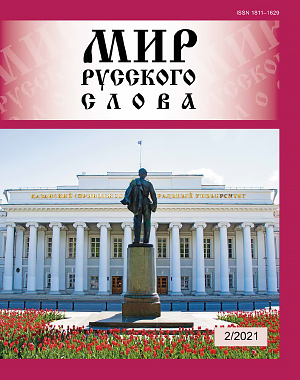SAMYJ as a Word-intensifier in the Modern Russian Language: Usage Models
DOI:
https://doi.org/10.24412/1811-1629-2021-2-53-60Abstract
The article considers the intensifying character of the pronominal word samyj (‘the very’). The intensity category is relevant to any level of language, from the sound aspect of speech to the complex syntactic whole. The relevance of this study lies in the fact that, in comparison with adjectives and adverbs, very few works are devoted to the question of the intensifying function of pronouns; the word samyj was clearly not considered enough in this aspect. The expression of intensity with this word is described in this article on the basis of several models: <samyj + qualitative adjective> (samyj krasivyj), <samyj + relative adjective> (samoe zhenskoe), <samyj + noun> (v samom nachale), <samyj + adverb> (po samoe nekuda), <samyj + verb> (po samoe ne khochu), <samyj + pronoun-noun> (samoe ono), <samyj + idiom> (samyj chto ni na jest’), <samyj + interjection> (po samoe pokorno blagodar’u) and <demonstrative pronoun + samyj + (noun)> (tot samyj sluchaj, to zhe samoe). The intensity of the indication, i.e. the deviation from the norm of manifestation of the quantity of the indication, the level of quantitative change of the indication within the measure, is clearly demonstrated on the gradation scale, at the extreme (initial) point of which is the form with the minimum degree of manifestation of the indication. The content plan of the word samyj as an intensifi er includes such functional and semantic operations as underlining, strengthening, completeness, evaluation, generalization, etc. The semantics of the word samyj as an intensifi er has an abstract character and contains the semes of subjectivity and expressiveness. The active use of constructions with this intensifi er in modern Russian language and speech testifi es to the strengthening of analytical tendencies in the grammatical structure of the Russian language.
Keywords:
word-intensifier, usage patterns, gradation scale, functional-semantic operation, analyticism
Downloads
References
Литература
References
Downloads
Published
How to Cite
Issue
Section
License
Articles of "The World of Russian Word" are open access distributed under the terms of the License Agreement with Saint Petersburg State University, which permits to the authors unrestricted distribution and self-archiving free of charge.




